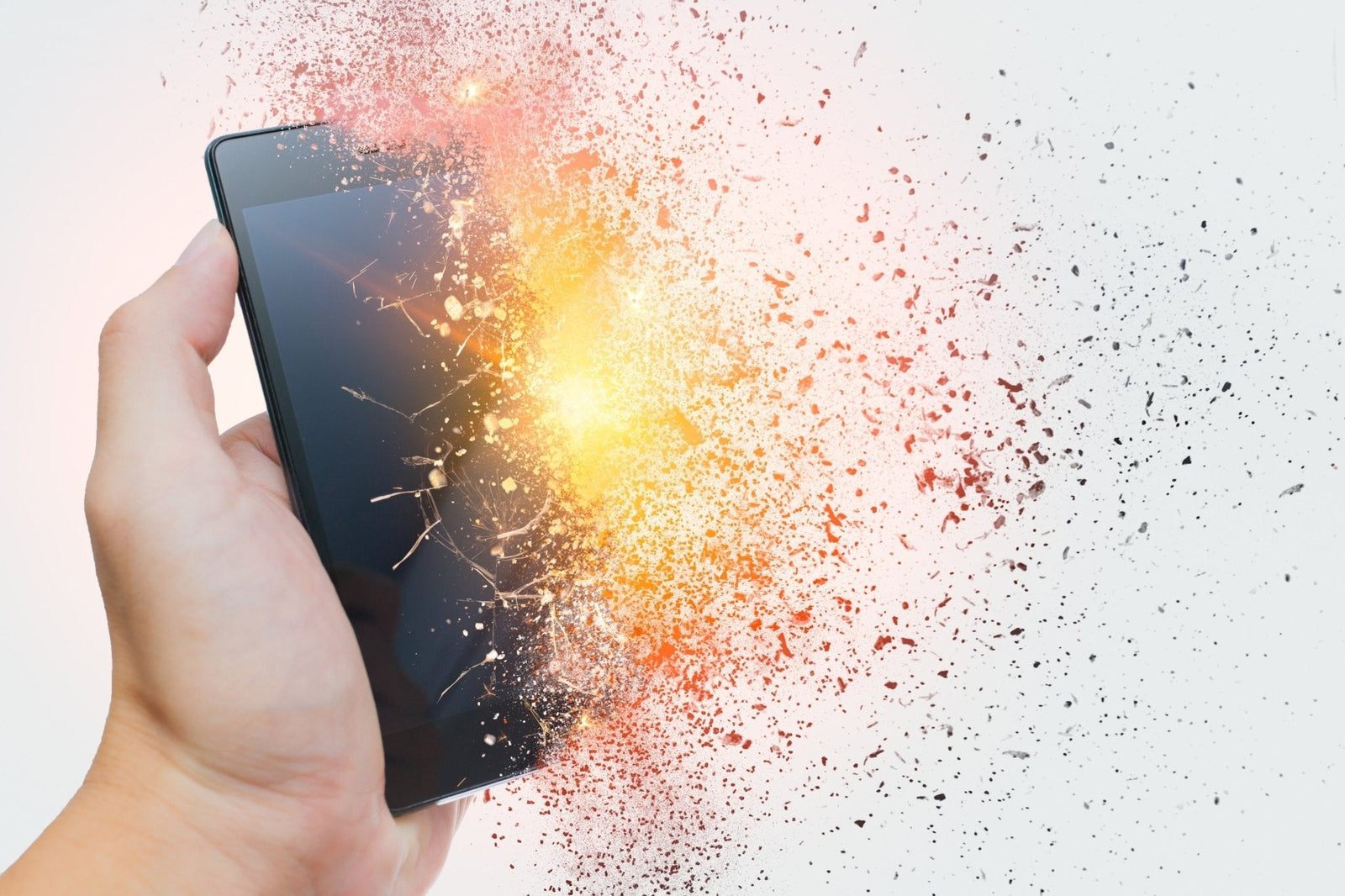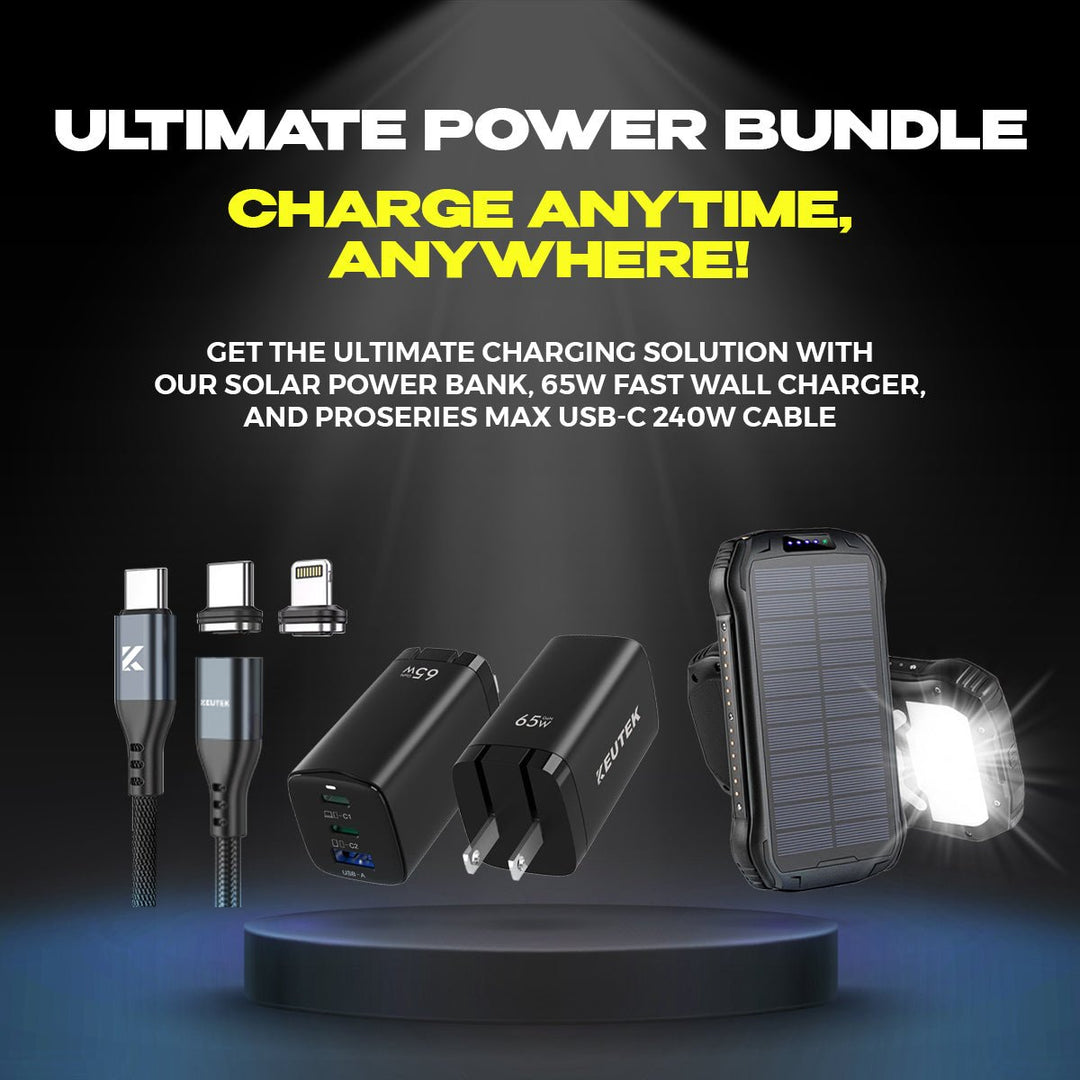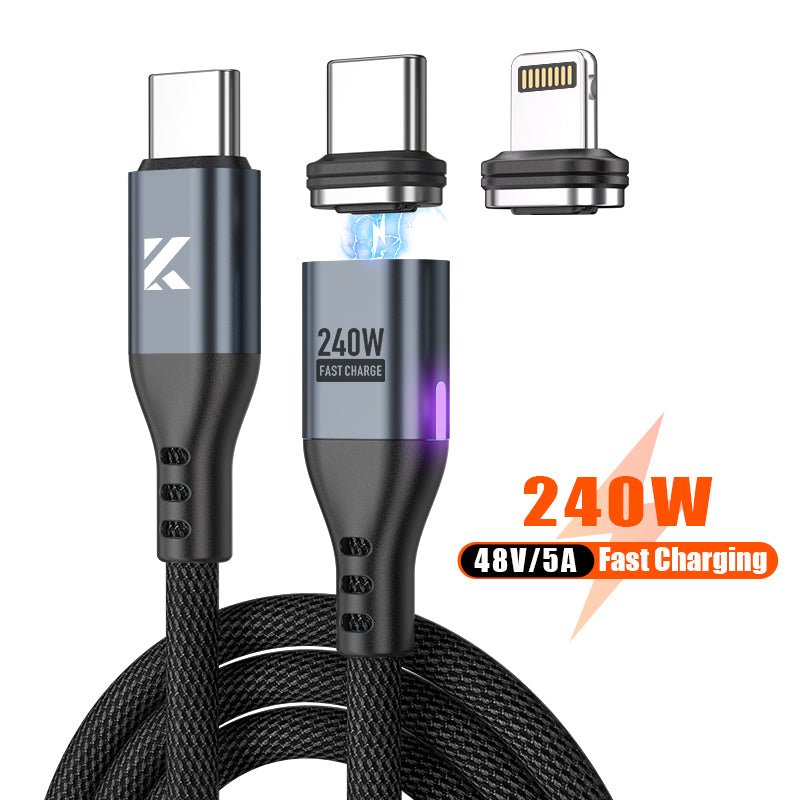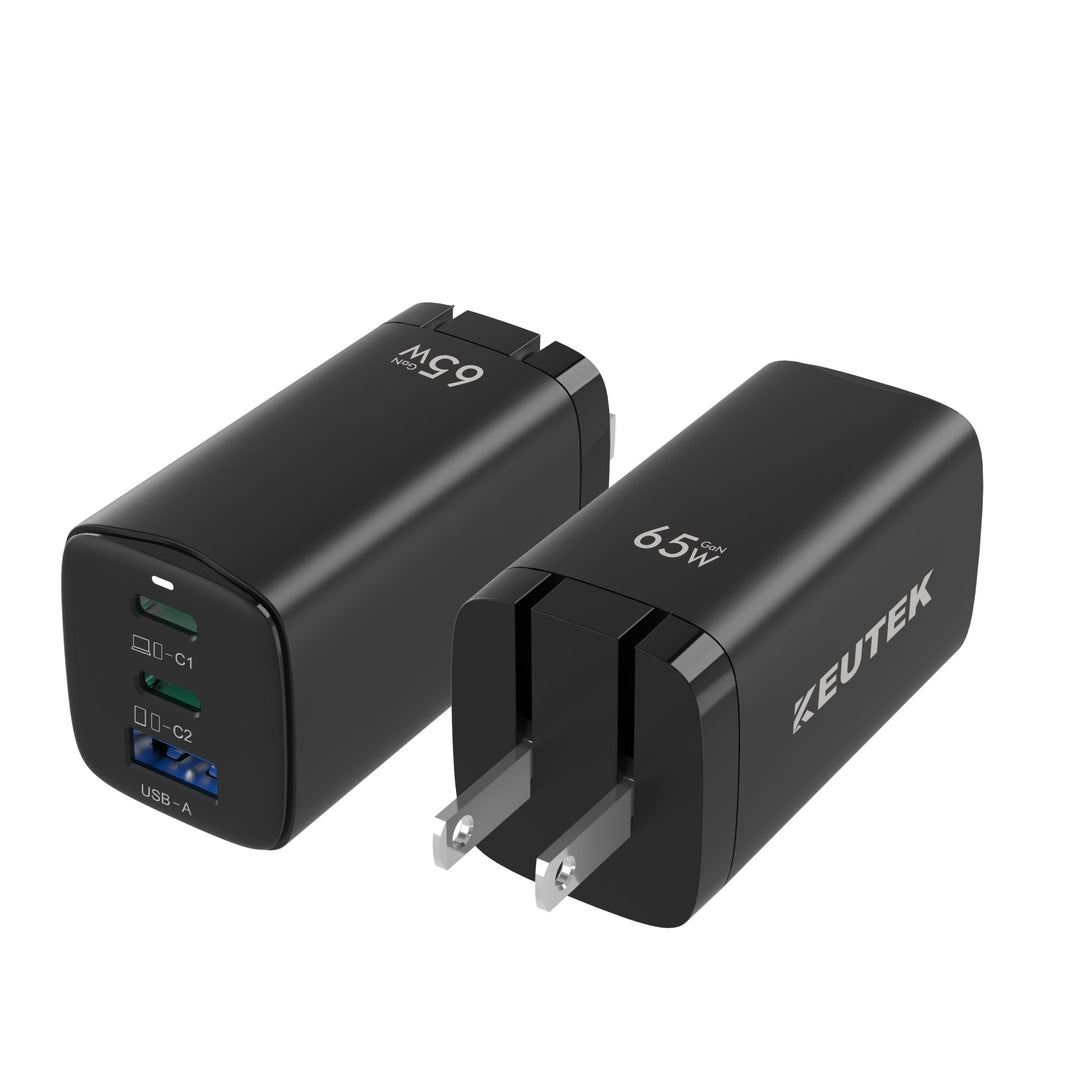Is It Bad to Charge Your Phone Overnight? The Truth

Let’s be honest, the most convenient time to charge your phone is while you sleep. It’s the one long stretch when you don’t need it. But this convenience comes with a nagging question: is the habit of charging phone overnight secretly shortening its lifespan? We invest a lot in our devices, and the goal is to make them last. We've all felt that warm phone in the morning and worried we're damaging the battery. Instead of a simple yes or no, we’ll explore what really happens and give you simple, actionable tips to do it safely.
If so, you've come to the right place. With all of the information out there about phone batteries and charging cables, we need to straighten the facts from the fiction. There are too many speculations.
So, if you're wondering, "will my phone explode if I leave it on the charger too long?" just keep reading. We're going to explain everything you need to know.
|
Crafted for heavy everyday use. Fast charges all Apple and Android devices. Charges up to 50% from 0% in 20 minutes. Automatic shutoff protects your device from overcharging. Shop Now |
Is It Bad to Leave Your Phone Charging Overnight?
In short, no. Your phone will not burst into flames, explode, or otherwise destroy itself if you charge it overnight.
There have been some instances of this happening, though. So, the fears surrounding these issues aren't baseless. In fact, phones used to explode when overcharging.
People submitted claims of their phones exploding in their pockets or on their nightstands. And, this was only a few years ago.
But, just a few years ago, phone batteries were made from Duracell. These kinds of batteries do overheat and explode if they overcharge. However, batteries today do not.
Today's phone batteries are Lithium-ion batteries. With this material, overcharging isn't a worry. In fact, it's not possible.
You could argue that someone with an old phone should be worried about overcharging. But, phone chargers have also improved in the past few years.
Newer smartphones have the ability to slow down charging when the device senses that it's close to being at full battery. Thus, the phone will never overcharge.
However, the phone doesn't cease charging altogether. Keep in mind that your phone is using the battery in the background to keep tasks running. So, as this uses up your battery, your charger will automatically recharge your phone as needed.
Can Your Phone Actually Overcharge?
Often, the real question is whether or not the smartphone battery is overheating or overcharging. Which one is causing the actual issue in our smartphones?
Well, the answer to this lies behind a small chemistry lesson.
We have a lithium-ion battery within our smartphones. This kind of battery does not allow the phone to overcharge, meaning that the phone cannot go over 100%.
However, any extra charge converts into heat. This is because rock salt forms on the cathode as the ions move from the cathode to the anode in the battery. This salt comes from the ionic reaction that's taking place as the phone is charging.
When your phone charges for too long, this rock salt will continue to build up. If the phone continues to overheat, the heat and rock salt will start shortening the battery's capacity.
Without its battery, the phone won't work. So, it's important to take care of your phone's battery.
In short, overcharging can cause overheating. Overheating causes salt buildup. Salt buildup can completely kill the battery.
So, charging your phone overnight can be dangerous. But, it won't cause your phone to explode.
Rather, you may notice some diminishing battery capacity.
How Modern Phones Prevent Overcharging
Thankfully, your phone is smarter than you might think when it comes to charging. Modern smartphones have built-in circuitry that acts as a power manager. As soon as your battery hits 100%, this system cuts off the main electrical current, preventing it from being overfed. Many phones, like iPhones with their Optimized Battery Charging feature, even learn your daily habits. They'll charge to 80% and then pause, waiting to deliver the final 20% right before you usually wake up. This smart delay reduces the time your battery spends at a full charge, which helps preserve its long-term health.
Understanding Trickle Charging
So if the main power cuts off, how does your phone stay at 100% until you unplug it in the morning? The answer is a process called trickle charging. Once your phone is full, the charging system switches from a steady flow to providing tiny, intermittent bursts of power. This "trickle" is just enough to replace the small amount of energy your phone uses while idle, keeping it topped off without stressing the battery. This is a standard, safe feature in all modern devices. To ensure this process works as intended, it's always best to use a high-quality power source. A reliable fast wall charger provides a stable and clean current, working perfectly with your phone’s internal safety mechanisms to keep your battery healthy.
Tips for a Healthier, Longer-Lasting Battery
If you're worried about your phone's battery life, you're not the only one. In fact, it's one of the most popular phone-related worries. This is because it only takes about 400 charges for you to notice a difference in your phone's battery life.
Some people believe that the fix for this problem is to avoid charging your battery in full. However, this doesn't fix the problem.
In fact, lowering the maximum charge that you put on your phone can lower your phone's maximum threshold for stored energy. It may give you more cycles, but those cycles are smaller and less efficient.
It's best to keep your phone's charge between 40% and 80%. This may give you the most like out of your device in the long run.
This may not be ideal if you like to charge your phone overnight. But, it's a great goal for those of you who can charge for a couple of hours a day.
If you find that your phone's battery is becoming more difficult, it may be best to try this method. Keep your phone's battery between 40% and 80% for a few days to find out whether or not this helps with your battery life.
|
Crafted for heavy everyday use. Fast charges all Apple and Android devices. Charges up to 50% from 0% in 20 minutes. Automatic shutoff protects your device from overcharging. Shop Now |
The 20-80% Rule: Is It Necessary?
So, is the 20-80% rule the secret to eternal battery life? Not exactly, but it can help. The idea is that keeping your phone's charge within this range puts less stress on the lithium-ion battery, potentially extending its overall lifespan. Think of it as asking your battery to jog instead of a full-out sprint. However, let's be realistic—this is a suggestion, not a strict command. If you have a long day of travel or back-to-back meetings, charging to 100% is perfectly fine. Don't let battery anxiety dictate your day. The best approach is a balanced one. When you're home or at your desk, try to unplug around the 80% mark. A quality fast wall charger makes this easy, giving you a significant power-up in a short amount of time so you don't have to stay tethered to an outlet for hours just to follow a guideline.
Remember: Batteries Are Consumable
Here’s the simple truth: your phone's battery is a consumable item. Like the tires on your car, it will wear out over time, no matter how perfectly you treat it. Every time you complete a charge cycle (the equivalent of charging from 0 to 100%), the battery's capacity degrades just a tiny bit. After a few hundred cycles, you'll start to notice it doesn't last as long as it used to. Sticking to the 80% rule might mean you have to charge your phone more often, which can be inconvenient. The goal isn't to obsess over percentages but to be prepared. As your battery ages, having reliable charging gear becomes even more critical. Keeping a fast-charging power bank in your bag or a powerful car charger on hand ensures you have power when you need it, without worrying about your battery's declining health.
How to Safely Charge Your Phone Overnight
Charging your phone overnight doesn't have to damage your phone. There are a few things that you can do to prevent battery degradation.
And, if you want to keep your phone from becoming a paperweight, you need to follow these methods.
1. Establish a Smart Charging Routine
If you have a regular bedtime every night, you should put your phone on the charger as a part of your nightly routine. We're not talking about plugging it in right before you fall asleep. Rather, you should plug it in for a few hours before you go to bed.
You could do this when you get home from work, while you're eating dinner, or while you're getting ready for bed.
During this time, it's best to not spend time on your phone. This is especially if you're planning on using battery-heavy apps.
This method is perfect for those of you with a routine from day to day. However, if you don't have a set routine, there are other methods that you can try.
2. Use Your Phone’s Automated Features
Your phone is pretty smart, and its charging process is no exception. Modern smartphones come with built-in technology that automatically stops the main charging current once the battery hits 100%. This prevents the kind of overcharging that could cause damage. After it's full, your phone only accepts tiny "maintenance charges" to counteract the small amount of power it uses while idle, keeping it at 100% until you unplug it. This intelligent system works best with a reliable charger that can properly communicate with your device. Using a certified, high-quality charger ensures your phone’s protective features can function as intended, protecting your battery from unnecessary stress and heat.
Many phones take this a step further with features like "Optimized Battery Charging" on iPhones or "Adaptive Charging" on Google Pixels. These systems learn your daily habits, like when you typically go to bed and wake up. Instead of rushing to 100% and sitting there all night, the phone will charge to about 80% and then pause. It cleverly waits to charge the final 20% until just before your usual wake-up time. This simple trick significantly reduces the time your battery spends at a full, high-stress charge, which is a key factor in preserving its long-term health. Take a moment to check your phone’s battery settings—if a feature like this is available, make sure it’s enabled.
2. Opt for Slower Charging When Possible
This one isn't a fan favorite but it may help to opt for a slow-charging cable. This will lower the amount of time that your phone is overheating at night.
Depending on how long you have your phone plugged in, your phone will likely still overheat a little. But, it won't be as bad as it is with regular chargers.
3. Know When to Use Fast Charging
On the other end, you could invest in a fast charging cable. This would make it easier for you to charge your phone for small sessions of time.
If you don't have a few hours at the end of the day to dedicate to charging your phone, you could use a fast charger to charge your phone even faster. A fast charger could even charge your phone while you're getting ready in the morning.
So, instead of having to worry about remembering to charge your phone at the same time every day, you can simply plug it in whenever you need a quick charge.
4. Use Certified Charging Equipment
The Risks of Cheap, Uncertified Chargers
It’s tempting to grab a cheap charger in a pinch, but not all charging equipment is created equal. Using the charger that came with your phone or a certified alternative is crucial for your battery’s health. Low-quality, uncertified chargers can deliver inconsistent power, which strains your battery and can even be a safety hazard. More importantly, they can bypass your phone's built-in protections. As tech experts at Samsung explain, modern phones are smart enough to stop charging at 100% to prevent damage. This feature, however, relies on a certified charger that can communicate properly with your device. A cheap one can't, leading to potential overheating and long-term battery degradation. Investing in quality gear, like a certified fast wall charger, ensures these safety features work exactly as they should.
More Smart Habits for Overnight Charging
If you're looking to avoid overheating your phone, there are a few other things that you should consider. The kind of charger that you get is immensely important. But, there are other factors that you need to think about when it comes to charging your phone overnight.
Here are some of our top tips if you're going to continue to charge your phone at night.
1. Let Your Phone Breathe
If you want to prevent your phone from overheating, you need to make sure that you aren't placing it in a hot environment.
Some people charge their phones on their beds or under their pillows. This is terrible when it comes to protecting the battery.
You need to make sure that you're protecting your phone by charging it in a place that doesn't trap heat. It's best to charge your phone on a flat, stable surface. This could be a bedside table, a counter, or something similar.
Don't lay your phone on anything cushiony while it's charging. This means that you shouldn't be leaving it on a mattress, a couch, or tangled in blankets.
2. Take the Case Off at Night
That phone case is great for protecting your phone from bumps and scrapes. But, they can heat up your phone unnecessarily while it's charging.
That's why we recommend removing your phone's case before plugging it into the charger. Phone cases can trap in heat and slow down cooling.
By removing your phone's casing, you will improve your phone's ability to dissipate any heat that it may create while charging.
Plus, it's unlikely that your phone will take a tumble in the middle of the night. So, letting your phone take a breather outside of its case isn't likely to cause any problems with the screen.
A Note on Wireless Charging and Heat
Wireless charging offers incredible convenience, but it’s important to know that it can generate more heat than charging with a cable. This isn't a flaw, but simply a byproduct of how the technology transfers energy. Since we know that excess heat is the primary culprit behind long-term battery degradation, managing it is key. When you're charging wirelessly, it becomes even more crucial to remove your phone's case, especially if it's thick, as it can trap heat against the device. Also, pay attention to placement. Making sure your phone is properly aligned on the pad allows for a more efficient charge, which in turn produces less waste heat. Using a high-quality wireless charger on a hard, flat surface will give your battery the best chance at staying cool and healthy.
3. Stop Force-Quitting Your Apps
Many people believe that closing all of their phone applications will help save their phone's battery. But, this isn't right.
It may help in the short run, but it will break down the battery later when you try to open the app again. You should only be forcing apps closed when they've frozen.
Choosing the Right Charger and Cable
"Will my phone explode if I leave it charging for six days?" In short, no.
But, there could be some other damage that happens depending on how overheated your device becomes. So, you need to make sure that you're following our charging tips and tricks.
Whether you're charging your phone overnight or sometime during the day, you need to make sure that you have the best charging equipment. Try our fast charging bundle today.
Frequently Asked Questions
So, is it actually okay to leave my phone charging all night? Yes, it is. Modern phones are built with safety features that stop the main electrical current once the battery reaches 100%. Your phone then uses a process called trickle charging, where it only receives tiny bits of power to stay topped off. So, you don't have to worry about the battery overcharging in the way older devices might have.
My phone feels warm in the morning after charging. Is that a bad sign? A little warmth is normal, but excessive heat is what you want to avoid. Heat, not overcharging itself, is the primary factor that degrades your battery's health over time. To keep things cool, make sure you're charging your phone on a hard, flat surface like a nightstand, not under your pillow or tangled in blankets where heat can get trapped.
Do I really need to follow the 80% charging rule? Think of the 20-80% rule as a helpful guideline rather than a strict command. Keeping your battery within this range can reduce stress and potentially extend its overall lifespan, but it's not always practical. If you have a long day ahead, charge your phone to 100% without worry. The goal is to adopt good habits when you can, not to create battery anxiety.
Does the quality of my charger and cable make a difference for overnight charging? It absolutely does. A high-quality, certified charger communicates with your phone’s internal safety systems to ensure they work correctly. Cheap, uncertified chargers can fail to do this, delivering an inconsistent current that can lead to overheating and bypass the very features designed to protect your battery. Using reliable gear is a simple way to protect your investment.
Is it better to take my case off before I charge my phone overnight? This is a great and simple habit to adopt. Phone cases are excellent for protection, but they can also trap heat, especially during a long charging session. Removing the case allows your phone to dissipate heat more effectively, which helps keep the battery healthy in the long run.
Key Takeaways
- Modern Phones Don't Overcharge, They Overheat: Your phone is smart enough to stop drawing power at 100%. The real enemy to your battery's lifespan is the excess heat generated during long charging cycles, which is what slowly degrades its capacity over time.
- Practice Simple, Cool-Down Habits: To charge safely overnight, remove your phone case and place it on a hard, flat surface like a nightstand—not your bed. Also, enable your phone’s "Optimized" or "Adaptive" charging feature in your settings to reduce stress on the battery.
- Your Charger Quality Directly Impacts Battery Health: Using a certified, high-quality charger is crucial. It communicates properly with your phone’s internal safety systems to prevent overheating and ensure a stable charge, which is essential for preserving your battery's long-term performance.
Related Articles
- Is It Safe to Charge Your iPhone 12 Pro Overnight? | KEUTEK
- Will My Phone Explode If I Overcharge It for Over 6 Days? | KEUTEK
- Your Cellphone Battery | How To Make It Last- KEUTEK
- Charging a Battery: 5 Tips for Longer Life – KEUTEK
- Smartphone Battery: The Best Charging Advice You’ll Ever Read | KEUTEK


















I did have a thought about something on the overcharging issue, but I don’t remember it right now. Even reading back thru part of the article didn’t remind me of what I had thought about.
I do, however, have a suggestion for limiting TBE charging time overnight. I have used a plug-in-the-wall timer, with the “on” tab disabled or removed. If your phone ( or other device ) normally takes 6 hours to charge, rotate the dial to 6 hours before the “off” time. When you plug it into the receptacle, with the charger plugged into it, it will run for 6 hours and shut off. The removed “on” tab would prevent the charger from turning on again.
I know this method works, because I have a couple of timers that I use this way, but not as frequently anymore as the batteries have improved.
Chuck
Leave a comment